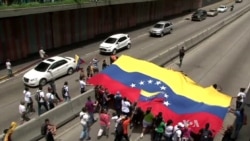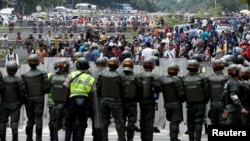Empty shelves fill the aisles at stores and pharmacies across Venezuela - while rolling power outages and scheduled blackouts force shopping centers to scale back their hours.
The economic crisis in Venezuela, which came as the result of falling oil prices and decades of financial mismanagement, culminated this week, with President Nicolas Maduro announcing a 60-day state of emergency.
The decree has been rejected by the opposition, which took to the streets this week calling for a referendum to force his ouster.
"What we are demanding is that we have a right for a transition to democracy in peace," Venezuelan opposition leader Maria Corina Machado told VOA.
"We know that this regime is willing to do anything to stop the right of the people, the will of the people, to live in freedom and democracy," she said. "But they won’t silence the people of Venezuela, not anymore."
Collecting signatures
Last month, the opposition began the process of collecting some 4 million signatures needed to trigger the recall vote.
"I think President Maduro doesn't have many options other than trying to stay in power by hook or by crook," said Washington, D.C.-based analyst Kevin Casas-Zamora, of the Inter-American Dialogue. "He knows that if there is a recall, he’s going to lose it."
Casas-Zamora said although the opposition may be able to collect the signatures for a recall, it may have little recourse.
"The thing is the noises that we’ve been hearing over the past few days suggest the government is closing the avenue of a recall altogether," he said.
Leaving no peaceful solutions
"And that’s precisely what is so serious about the situation, that if you close up that avenue, there is really no peaceful option to settle what has become political gridlock on a grand scale," Casas-Zamora said.
On Wednesday, Maduro predicted the demise of the opposition-led parliament - weeks after threatening a constitutional amendment to cut short its five-year term.
"The national assembly has lost political validity; it is a matter of time before it disappears, that is what I believe. It is disconnected from the national interest."
The Venezuelan leader also accused the United States of plotting a scenario of violence in the country to justify a foreign military intervention to force him from power.
US expresses concern
At a news conference earlier this week, White House spokesman Josh Earnest said the failure to find a political solution puts thousands, if not millions of Venezuelans, at risk of further suffering.
"Obviously we continue to be quite concerned about the well-being of the people of Venezuela," said Earnest. "But the solution to these challenges will require the inclusion of all interested parties. And now is the time for leaders to listen to diverse Venezuelan voices and work together peacefully.”
The International Monetary Fund predicts that inflation in Venezuela, which is already the world’s highest, could more than double in 2016, topping out at more than 720 percent.
Alvaro Algarra contributed to this report from Caracas, Venezuela.












